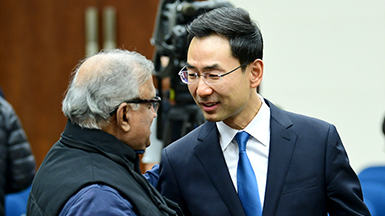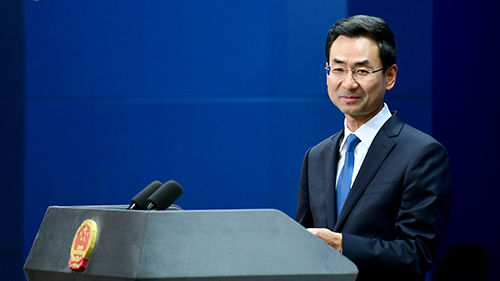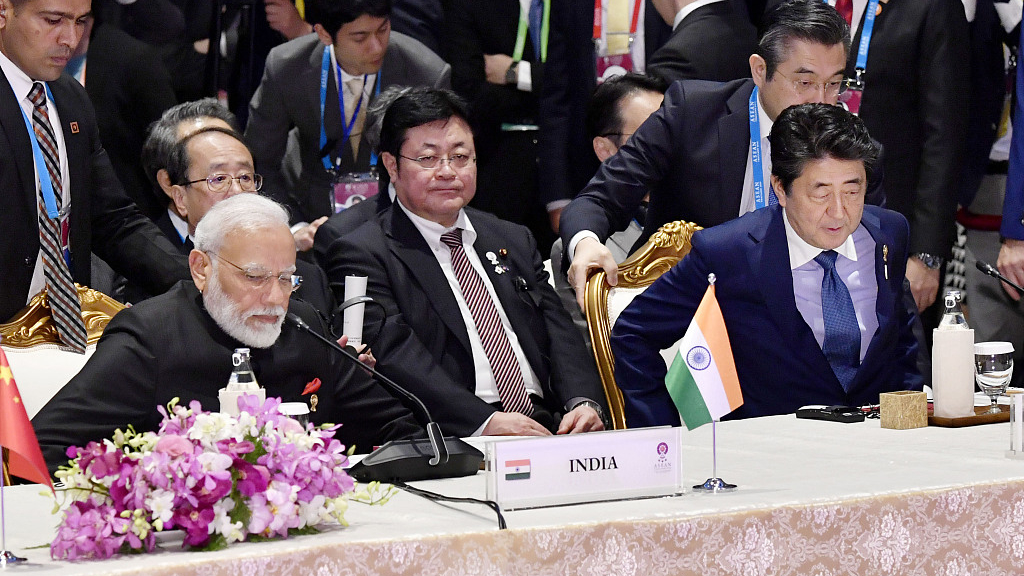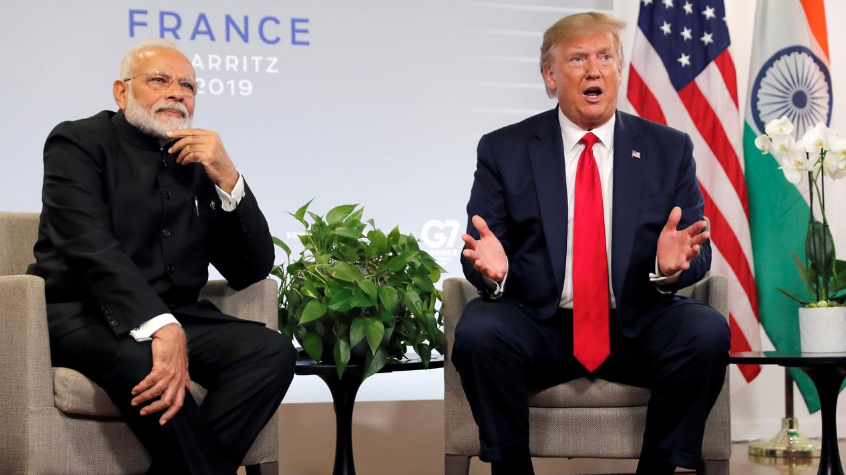
Chinese Foreign Ministry Spokesperson Geng Shuang (R) talks to Press Trust of India's China Correspondent K J M Varma during a press conference in Beijing, November 5, 2019. /Photo via China's Ministry of Foreign Affairs
Chinese Foreign Ministry Spokesperson Geng Shuang (R) talks to Press Trust of India's China Correspondent K J M Varma during a press conference in Beijing, November 5, 2019. /Photo via China's Ministry of Foreign Affairs
China on Tuesday said it remained hopeful that India will join the Regional Comprehensive Economic Partnership (RCEP) "at an early date", assuring that Beijing will work towards resolving New Delhi's outstanding issues "in the spirit of mutual understanding and accommodation."
"I want to stress that the RCEP is an open initiative. China will continue to work with all parties to resolve the outstanding issues for India through negotiations in the spirit of mutual understanding and accommodation. We welcome the joining of India at an early date," Chinese Foreign Ministry Spokesperson Geng Shuang said at a press conference in Beijing.
The RCEP has been aiming to conclude that world's largest free trade pact which involves 16 Asia-Pacific countries bringing in the 10-member Association of Southeast Asian Nations (ASEAN), China, India, Japan, South Korea, Australia and New Zealand.
On Monday at the RCEP Summit in Bangkok, India pulled out of the expansive trade pact citing concerns about market access while the other 15 participants agreed on the draft agreement, aiming for the deal to be signed most likely in February next year.
India has been worried that the agreement, which is aimed at gradual elimination of tariffs, would adversely impact its domestic industries, particularly the textile, dairy and agriculture sectors. India fears that its domestic markets will be flooded by cheaper goods from other RCEP members, mainly China, and dairy and agricultural produce from Australia and New Zealand that would harm local producers.
India already runs a large trade deficit with 11 of the 15 RCEP countries, which has doubled in the last five years. In 2018-19, India's collective trade deficit with all RCEP members stood at 105 billion U.S. dollars, of which China alone accounted for 54 billion U.S. dollars.

Geng Shuang addresses a press conference in Beijing, November 5, 2019. /Photo via China's Ministry of Foreign Affairs
Geng Shuang addresses a press conference in Beijing, November 5, 2019. /Photo via China's Ministry of Foreign Affairs
Allaying India's fears, the Chinese foreign ministry spokesperson stressed that the RCEP is a two-way and complementary arrangement. "The RCEP is a regional FTA featuring mutual benefits in nature. Once signed and put in place, the RCEP will help Chinese goods go to the Indian and other participating countries' markets. In the same vein, it will also help Indian goods to enter China's and other participating countries' markets."
Emphasizing that China and India jointly offer a huge market of 2.7 billion people with tremendous trade potential, Geng assured that Beijing doesn't pursue trade surplus against India.
"Over the past five years, China's imports from India have increased by 15 percent. The two sides should explore more ways and comprehensive measures to step up cooperation in investment, production capacity and tourism, making the pie even bigger and fostering balanced and sustainable trade relations," he said.
Earlier on Monday, Indian Prime Minister Narendra Modi said he could not compromise the interest of farmers and workers at home by joining the RCEP. "When I measure the RCEP agreement with respect to the interests of all Indians, I do not get a positive answer," he said while addressing RCEP leaders in Bangkok.
Modi argued that "the present form of the RCEP agreement… does not address satisfactorily India's outstanding issues and concerns," and therefore, "in such a situation, it is not possible for India to join RCEP agreement."

Indian Prime Minister Narendra Modi (L) and his Japanese counterpart Shinzo Abe at the Regional Comprehensive Economic Partnership summit on the outskirts of Bangkok, Thailand, November 4, 2019. /VCG Photo
Indian Prime Minister Narendra Modi (L) and his Japanese counterpart Shinzo Abe at the Regional Comprehensive Economic Partnership summit on the outskirts of Bangkok, Thailand, November 4, 2019. /VCG Photo
A joint statement from the leaders of the 15 RCEP countries announcing their agreement on the trade pact also acknowledged India's concerns, saying they remained committed to resolve the issues in a "mutually satisfactory way".
"India has significant outstanding issues, which remain unresolved. All RCEP Participating Countries will work together to resolve these outstanding issues in a mutually satisfactory way. India's final decision will depend on satisfactory resolution of these issues," it said.
Suggesting the India's inclusion in the RCEP is an open matter, China's deputy foreign minister Le Yucheng said: "Whenever India is ready, it is welcome to get on board."
Report: India mulls FTA with U.S., EU
Meanwhile, The Times of India reported that India was exploring a free trade agreement with the U.S and the EU, quoting a senior government official, prompting speculations of a strategic shift within New Delhi.
"At present, India is exploring trade agreements with the USA and the European Union, where Indian industry and services will be competitive and benefit from access to large developed markets," India's Commerce and Industry Minister Piyush Goyal was quoted as saying by The Times.

U.S. President Donald Trump (R) and Indian Prime Minister Narendra Modi during their bilateral talks on the sidelines of the G7 Summit in Biarritz, France, August 26, 2019. /Reuters Photo
U.S. President Donald Trump (R) and Indian Prime Minister Narendra Modi during their bilateral talks on the sidelines of the G7 Summit in Biarritz, France, August 26, 2019. /Reuters Photo
For years, India has rejected suggestions of such a deal with the U.S. and had denied that such a proposal is under consideration even after U.S. President Donald Trump hinted about it in a tweet a few months ago.
While some analysts viewed the development as a strategic shift for India, others insisted it was an attempt by New Delhi to prevent the negative fallout of its withdrawal from the RCEP.
"India will now try to mitigate the damage done to its relations with ASEAN, Japan and others – as well as the negative message it sends to international businesses and investors about reform prospects in India – by its decision not to move ahead with RCEP at this moment, and perhaps not at all," Eurasia Group analysts said.
The Indian government will "try to make positive noises about progressing trade talks with the U.S. and the EU and will expedite efforts to upgrade its free trade agreement with ASEAN," they added.
Domestically, Modi's decision was hailed by local farmers and industry. India's largest dairy producer Amul thanked Modi for "supporting livelihoods," while farmer associations said the rejection of the deal was "a huge victory for farmers."